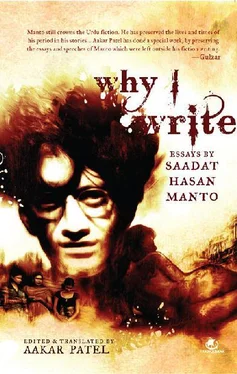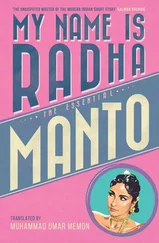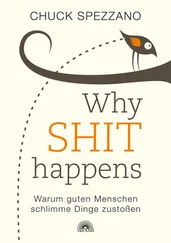Iqbal: ‘Nothing. I was about to say that I’ll stick to soda.’
Munshi: ‘Aren’t you being stubborn? Someone might think I’m forcing you to down poison instead of a fizzy lemon drink. Arrey bhai, what’s really the difference between lemon and soda? Both bottled in the same factory. Both filled in by the same machines. If we were to remove from lemon the sugar and the essence, what would we be left with?’
Iqbal: ‘Soda.’
Munshi: ‘Exactly. Then what’s the problem with having lemon?’
Iqbal: ‘No problem at all.’
Munshi: ‘Excellent. Then here — have mine.’
Iqbal: ‘What will you have?’
Munshi: ‘I’ll call for another bottle.’
Iqbal: ‘You don’t need to. What’s wrong with having this soda?’
Munshi: ‘No… problem… as… such.’
Iqbal: ‘So have it.’
Munshi: ‘What will you have then?’
Iqbal: ‘Me… I’ll ask for another bottle.’
Munshi: ‘You don’t need to. What’s wrong with having this lemon?’
Iqbal: ‘Nothing wrong at all. What’s the problem with having this soda?’
Munshi: ‘No problem at all.’
Iqbal: ‘The thing is that soda is a little better.’
Munshi: ‘In my opinion, lemon is a little better.’
Iqbal: ‘Must be. But I’ve heard from my elders that soda is better.’
Munshi: ‘What of it? Even I’ve heard from my elders — lemon is better.’
Iqbal: ‘What’s your personal opinion?’
Munshi: ‘What’s your personal opinion?’
Iqbal: ‘My opinion… My view… Is that… But why don’t you tell me what your opinion is?’
Munshi: ‘My opinion… My view… Is that… But why must I reveal my opinion first?’
Iqbal: ‘This way we’ll never know. Let’s both cover our bottles and settle this at leisure.’
Munshi: ‘That’s not possible. The bottles are already open. Now we’ll have to drink from them. Decide quickly, else we’ll lose all the gas. And the gas is the main thing in these drinks.’
Iqbal: ‘I agree. And I see you also accept that there’s no real difference between lemon and soda.’
Munshi: ‘When did I say there’s no difference between lemon and soda? There’s a lot of difference. Lemon has sweetness, fragrance, sourness. That is, three things more than soda. What does soda have? Only gas — and so much of it that it gets into the nose. Compared to this, lemon is delicious! Have a bottle and you’ll be good for hours. Soda is for those who are unwell. And you admitted a while ago that lemon was tastier than soda.’
Iqbal: ‘All right. But I didn’t accept that lemon is better than soda. Being more tasty doesn’t necessarily mean it’s more beneficial. Pickle is very tasty but you know how bad it can be for you. Merely being fragrant and sour doesn’t make something good or better. Ask any doctor and you’ll know that sourness brings indigestion. But soda! Now here’s a great thing for digestion.’
Munshi: ‘Look, let’s settle this by mixing the two.’
Iqbal: ‘I’ve no objection.’
Munshi: ‘Then fill that glass half with soda.’
Iqbal: ‘Why don’t you fill it half with lemon first?’
Munshi: ‘What’s this? Why don’t you want to pour it first?’
Iqbal: ‘I want to have a mix of soda-lemon.’
Munshi: ‘And I want to have a mix of lemon-soda.’
— (Originally published as Hindi Aur Urdu , in Manto Ke Mazameen , 1954)
Thirteen Types of Freeloaders
The Second World War brought severe shortages to India as goods and services were diverted to the war effort in Europe. The army had been expanded and consumed vast quantities of foodstuff. These were rationed across India, as also were cigarettes, which now had to be got from the black market. Manto was always short of money, and often in debt. His circle of friends was mostly writers, poets and artists, none of whom was particularly well off either. How did such people manage? With difficulty. Manto tells us in this piece about how people regularly bummed cigarettes off him.
Type 1:
You’re watching a movie. You take a cigarette out of your pocket. The man on the next seat is a freeloader. He’ll stare at your tin and say, ‘Where do you get these from, sir? The black market?’
‘Yes,’ you say.
‘Oh,’ he says, ‘I’ve been looking for them for a long time. Can’t find them anywhere. It’s a great smoke, isn’t it?’
‘Be my guest,’ you say, holding out the tin.
‘Thanks.’
During the interval, he’ll hit you for one unsolicited. ‘I enjoyed the first half, thanks to you. Another would really seal it.’
Type 2:
You’ve boarded a train. It sets off. You pull out your packet. The man next to you begins to pat his pockets. He then says something. Like, ‘Damn!’ or ‘Not again!’
You’re certain to ask: ‘What’s wrong?’
He’ ll smile and say, ‘Nothing really, forgot my cigarettes in the tonga.’
‘Oh,’ you say, ‘for now, smoke mine.’
And he will. Several times.
Type 3:
Zaid is your friend. But you haven’t figured out he’s a freeloader. Every day he puts his arm around your shoulder, sighs and says, ‘ Lao bhai, ab cigarette pilvao’ (Come brother, give me a cigarette) as if he were doing you a favour by smoking your quota.
Type 4:
You’re on a park bench. The man next to you is focussed on his book. You pull out a tin of cigarettes. He’s a freeloader. He quickly strikes a match and holds it out for you. You in turn offer him a cigarette. He thanks you.
Type 5:
You’re acquainted with Bakr, but not too well. Not enough to know he’s one of them. He offers you his packet. You take it, but it’s empty, of course.
He’s shocked to know this, and expresses his regret. You take out your stock and offer one to him.
Type 6:
This is a special type of freeloader who only smokes particular brands. The moment he sees a friend or acquaintance bearing 555 or Craven A cigarettes*, he cries out in joy — ‘Zindabad! Now here’s a cigarette worth smoking.’
He’ll light one and stuff six or seven in his pocket: ‘Sorry, but I can’t do with just one.’
Type 7:
This is an unusual type. You’re standing with your friends outside the YMCA Hall. You put a cigarette in your mouth and are about to strike a match. A man walking past quickly turns into you and takes the cigarette from your lips, and the match from your hands. He lights it, and then walks off, puffing.
You think he’s mad (he isn’t) and this is the subject of your discussion for some time.
Type 8:
This is a particularly brazen type. You’re fed-up with him and say: ‘Boss, why don’t you smoke your own?’
He replies: ‘I’ve promised never to smoke cigarettes I’ve bought myself. Smoking those that others have paid for is far more pleasurable. You should try it.’
Type 9:
Slightly different from Type 8:
You’re fed up with him and say: ‘Boss, why don’t you smoke your own?’
He replies: ‘The doctor says I shouldn’t be smoking. If I carry them on me, I can’t control myself. That’s why every now and then I ask for one from a friend…’
Type 10:
This one is like a court poet.
‘I swear to god, Manto is a prince among men when it comes to cigarettes. You may not find a good cigarette anywhere in the world, but he’ll be carrying one for certain. My friend, show us what you’re carrying these days.’
You pull out your pack of cheap smokes.
Читать дальше












